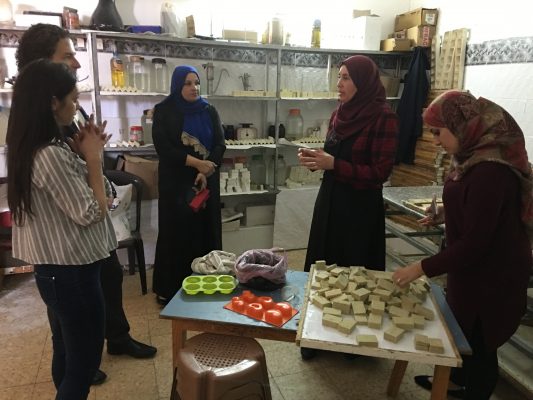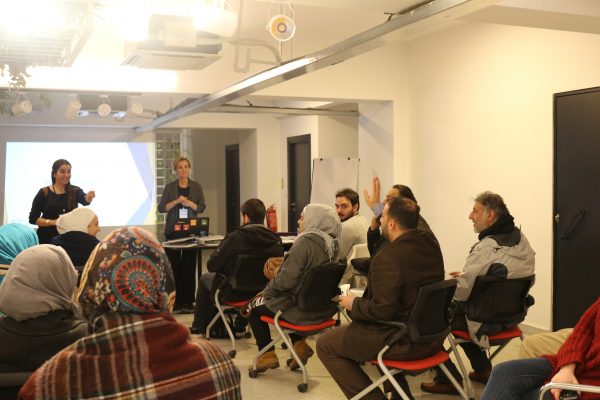
Can women’s empowerment programs cause meaningful change? On March 26, 2018, the Center for International Private Enterprise (CIPE) facilitated a webinar with partners and participants from the Middle East and North Africa (MENA) region to discuss this question. Raja’ Hamayel, the Chair of the Palestinian Businesswoman’s Association Asala, and Heba Amr, Founder of the social enterprise Qawareer in Egypt, led the discussion about needs for women’s programming in the MENA region. It quickly became clear that the participants agreed that such programs can succeed, but it depends on program design and implementation.
The participants’ discussion identified four areas for improvement in women’s empowerment programs:
Program Drivers: In many programs, often funded by international donors, there can be a gap between the program they designed based on perceived needs and the local needs of the target women groups. Missing the mark in the needs assessment leads to a decreased return on investment for donors and little benefit for the population being served.
Duration: Similarly, a short-term, one-off program or training does not allow women to build the skills or community buy-in to be empowered in the long term. Participants said that the local community will still take advantage of the donor’s programming, but there will be little long-term change.
Inclusivity: Programming that only trains women without reaching out into the broader social fabric will also have limited success. Women could receive training every day, but if the community is not supportive, it will be more difficult for the program to achieve its objective of empowering women economically or otherwise.
Localization: Community buy-in for programs is essential for program success. If a women’s empowerment program, or any such initiative, is not developed locally or designed in collaboration with local partners, it is much harder to create lasting impact. People need to feel that they have ownership over the program to trust that it is actually serving their needs and will continue after the donor leaves.

Participants emphasized that programs that do not take these key components into consideration during implementation can adversely affect the women they are trying to help. The effects demonstrate a wide array of reactions to these programs’ attempts to empower women. On one end of the spectrum, women’s programs that lack wider community outreach can isolate women and disempower them. They create conflict between women, men, and social expectations because, while the programs change perceptions among the women they service, the local community still retains the same cultural expectation about how women should behave within society. This discrepancy can cause backlash against women and actually perpetuate the cultural norms women’s programs seek to change.
On the other end, women’s economic empowerment programs that are poorly implemented could create backlash against women who choose to take more “traditional” roles by staying home to care for their families. By creating an expectation that women must work outside the home in order for society to move forward, women who choose to stay home are stigmatized as inferior to the women who can “do it all.” This puts further pressure on them to take on an increasingly heavy workload whether they want to or not as there is no established cultural norm for men to share household duties with women.
How, then, do organizations developing women’s programming, such as CIPE, actually create meaningful, lasting change for women? For one thing, participants said, don’t focus solely on the women. While it is important to have women-only programming, women’s programs must also address different audiences and show that empowering women will benefit society as a whole. Reaching out to community leaders and men in general and engaging them in women’s empowerment programming will change social expectations about the role of women in the community. It will allow women to receive the relevant training they need while also involving men in the transformation process.
By involving men and the wider community, organizations can create greater buy-in for their programs, which will lead to greater community ownership of the program and increased opportunities for its long-term sustainability. While this buy-in is a crucial component, programs must make sure to focus their efforts on creating lasting socio-cultural change that allows women to choose their priorities and men to participate in household duties without being judged or stigmatized because of those choices.
As the discussion drew to a close, participants reiterated the need for women’s programming that adapts to the conditions within the specific community of implementation. Women, they asserted, are already incredibly resilient. To successfully achieve women’s empowerment, the wider community must be involved in programs that encourage women to choose their own paths based on their own priorities, not on community expectations.
Barbara Gallets is a Program Assistant for the Middle East and North Africa team at CIPE. For more information on CIPE’s work in the MENA region, including Palestine, Egypt, and Jordan, visit CIPE’s MENA webpage.
Read more:
Learn how cyber violence is impacting gender equality and women’s economic empowerment.
Advocating for the enforcement of existing laws is a crucial step towards bridging the gender gap in Jordan.
A new global consortium takes a holistic approach to empowering women and girls.
Listen to a podcast:
Former Malawi President Joyce Banda discusses women’s economic empowerment in Africa.
Published Date: April 17, 2018